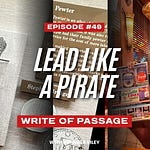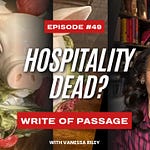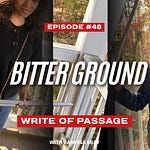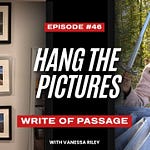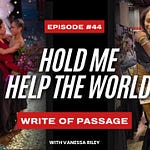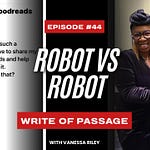When I was in school, I once had a saying, "Sleep you can get any old time, but grades last forever." At the time, I meant it. It wasn’t the best mindset, but it fueled my drive to maintain a near-perfect grades. As an overachiever, I found comfort in metrics—things that could be measured, quantified, and tracked. That’s how I knew I was doing well. They were the invisible pats to the shoulders. You did good. With working divorces parents who just always couldn’t be there, numbers were a great substitute. Numbers gave me a sense of security, a tangible way to validate my efforts, to validate me.
Vanessa literally on a treadmill.
Unfortunately, I’m not alone. I believe the validation race is everyone’s personal kryptonite and the obsession starts young. My last year in elementary school, I won everything—the Citizenship Award, honors in science and math, and a spot on the honor roll. It was an amazing experience to be recognized by my teachers and the principal. But I remember vividly that same day, being called to a third-grade classroom to encourage my younger brother. He was upset because he hadn’t won anything. I had to gently explain to him that awards like these were given in sixth grade because students were preparing to transition to middle school. It wasn’t his time.
Still, it was difficult to celebrate my accomplishments while knowing he was in pain. Even though he wasn’t eligible for the awards, he still felt the sting of being left out. That’s what the constant chase for validation does to us—we seek it even when we don’t need it, even when it’s not our time to be evaluated or recognized. We keep chasing the numbers, keep running on the validation treadmill.
But the problem with numbers is that when you focus on them too much, you can lose sight of the journey. This isn’t just an issue for young people and students—it follows us into adulthood, into our careers, and for those of us who write, into the publishing world. As an author, numbers are everywhere. It starts with the word count—how many words it takes to complete a manuscript; how many get cut during editing. Then comes the timeline—how long it takes to get through copyediting. A friend of mine showed me how to take a manuscript that has been copy-edited and put it into Pages to track the number of revisions. And while that was cool to learn, it was just another number to haunt me, to obsess over, and to try to get right—whatever that means.
More publishing numbers: how quickly the book needs to be turned around, how many months, days to pub. And then, the numbers shift to reception—the number of reviews, Goodreads ratings, NetGalley and Eidelweis requests. The numbers don’t stop. They just change shape.
Once the book is out, the chase continues: the number of posts on social media, the number of followers, the number of subscribers. The formula for success remains elusive, and the pressure builds. Writers aren’t alone in this. No matter your field, numbers are always chasing you—performance metrics, annual reviews, engagement rates, sales quotas. The cycle never ends. And after a while, this constant pursuit can overshadow the real goal: growth, creativity, and fulfillment.
This endless race can lead to burnout. And burnout looks different for everyone. Some people cry. Some people yell. Some people run miles to clear their heads. Me? I bake deep-dish apple pies. My husband knows I’m in trouble when I start making a pie crust from scratch for no particular reason. He can hear how hard I’m chopping those apples. He sees the intricate lattice work I’m designing on the crust—each crimped edge and delicate braid a sign I’m trying to regain control in a world that feels overwhelming. That’s when he knows to bring me a latte or a pile of chocolate, because his wife is spiraling.
The truth is, we all need people who can pull us out of the chase, who can remind us to stop counting and start living. Rest is not a luxury—it’s a necessity. And rest doesn’t always mean sleep. Just as praying without ceasing doesn’t mean sitting still, resting is an active practice. It can be stepping away from the numbers, engaging in something that feeds your soul, or simply taking a breath. Rest looks different for everyone, but without it, we suffer. Our bodies wear down, our creativity dims, and our minds stop firing in the ways they need to. For a writer, that means losing the very words we work so hard to find.
How do we heal? How do we stop the obsession? I don’t know. We all tick differently. Some books that might help are:
The Courage to Be Disliked by Ichiro Kishimi & Fumitake Koga – A thought-provoking book based on Adlerian psychology that challenges the need for external validation and encourages self-acceptance.
Radical Acceptance by Tara Brach – Explores the power of self-compassion and mindfulness to break free from the cycle of seeking approval.
The Gifts of Imperfection by Brené Brown – A powerful read on embracing authenticity and letting go of the need for validation from others.
What Happened to You? by Oprah Winfrey & Dr. Bruce Perry – Looks at how past experiences shape our need for validation and how to heal from them.
Fiction provides great examples of validation in all stages. Before I Let Go by Kennedy Ryan deals with validation, self-worth, and healing for both main characters, Yasmen and Josiah, as they try to define their post-divorce evolving identities.
One of the reasons I loved writing Scarlet Wilcox in my upcoming novel A Wager at Midnight is because she has divorced that part of her brain that seeks judgment. She doesn’t care what others think unless it affects her family. Yet, as brave, bold, and daring as she is in seeking her path to bring medicine to those who cannot get it—those whom society deems ineligible or unworthy—she still slips into wanting validation from a physician, Stephen Carew. Scarlet is a good balance of all of us, and I loved writing those moments where she is free of cares and when she’s forced to face her fears.
So I am giving you permission to take a moment for yourself. If you take nothing else from this podcast, learn this: It’s okay to rest. It’s necessary to rest and not focus on numbers or being superhuman. If you don’t take care of you, your body, mind, and creative being, the world will chew you up body, dry up your spirit, and move on to the next overworked soul.
But you? You are the hero of your own story. And every hero needs rest. So take off your cape, stretch it into a hammock, and allow yourself a moment of peace.
Show notes include a list of the books mentioned in this broadcast. This week, I'm highlighting Eagle Eye Bookshop through Bookshop.org.
Kishimi, I., & Koga, F. (2018). The Courage to Be Disliked: How to Free Yourself, Change Your Life, and Achieve Real Happiness. Atria Books.
Brach, T. (2003). Radical Acceptance. Bantam.
Brown, B. (2010). The Gifts of Imperfection: Let Go of Who You Think You're Supposed to Be and Embrace Who You Are. Hazelden Publishing.
Winfrey, O., & Perry, B. D. (2021). What Happened to You? Conversations on Trauma, Resilience, and Healing. Flatiron Books.
Riley, V. (2024). A Wager at Midnight. Kensington Publishing.
Ryan, K. (2022). Before I Let Go. Forever.
Thank you for listening.






